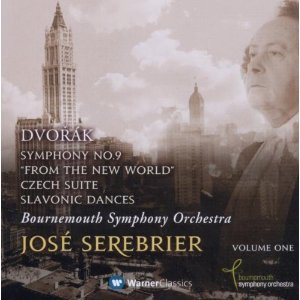Hough, London Philharmonic Orchestra, Alsop, Royal Festival Hall
Had enough of Liszt? We haven't
Poor old Stephen Hough. The Liszt double. Again! Was he not at all Liszted out after last year's epic bicentenary? Were we not Liszted out by last year's epic bicentenary? Hough has been living, breathing and eating these two pieces for the past year and a half. The familiarity might have bred contempt. Amazingly it hasn't. In fact, all the prep work of last year appeared to make this performance of the first two piano concertos one of the most satisfying I've heard.

 Dvořák: Symphony No 9, Czech Suite, Two Slavonic Dances Bournemouth Symphony Orchestra/José Serebrier (Warner Classics)
Dvořák: Symphony No 9, Czech Suite, Two Slavonic Dances Bournemouth Symphony Orchestra/José Serebrier (Warner Classics)